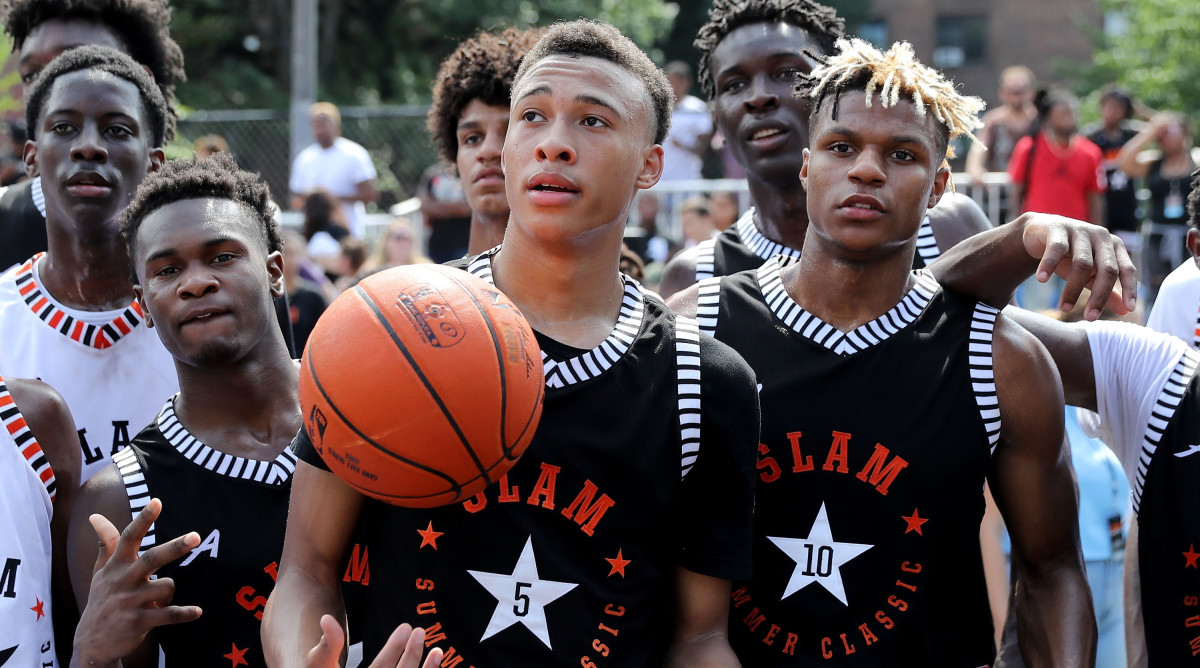R.J. Hampton Q&A: Tough Decisions and the Potential Costs of Skipping College

R.J. Hampton's decision to skip college and play for the New Zealand Breakers in the NBL has brought about a lot of attention. But for the former high school star, this decision appears to be less about headlines and more about becoming an NBA mainstay. He discussed his basketball journey with Rohan Nadkarni of Crossover TV and explained why he remains so confident is the path he's taking to the league.

Rohan Nadkarni: Here’s my first question: What’s it like being popular in high school? I don’t know what that’s like. You’ve been kind of a big deal, there’s a lot of national interest in you. Can you just give me a glimpse into what it’s like to be a cool person in high school?
R.J. Hampton: You have a lot of people who just want to be your friend because you’re cool, you get invited everywhere and that’s basically it in high school.
Nadkarni: What are your Instagram DMs like? Mine are very dry. What’s going on with yours? I got to know.
Hampton: You get Instagram DMs from all of the college fans saying you should go to this school, go to that school; now I have fans from New Zealand and the Breakers saying, ‘I can’t wait for you to come.’ I get a lot of DMs a day.
Nadkarni: I saw you tell Bleacher Reporter you kind of decided a month before you made your announcement that you were going to go professional and you kept it under wraps. Why did you decide to keep it a secret for a month?
Hampton: I probably just tried to keep a secret as long as I could because I wanted to make the decision when I was ready. I didn’t want anyone else to force me to make the decision when they were ready, I just wanted to do it when I was ready and I wanted to wait until school was out.
Nadkarni: You told me you actually haven’t been to New Zealand yet. When you were researching this decision, how did you end up choosing the National Basketball League? What were the factors, because there are a lot of international basketball leagues that you could have played in?
Hampton: I think the ownership was good, with Matt Walsh, Shaun Marion, two former NBA and college basketball players; they’re over the team I’m going to be playing for. New Zealand is just a nice city; it’s a beautiful city. I don’t know who wouldn’t want to play there.
Nadkarni: Do you think you’ll miss anything about getting the college basketball experience? Obviously you were getting recruiting you were getting that experience. Is there anything you’ll be kind of sad to miss out on?
Hampton: Maybe the only thing would be like March Madness, but that’s not my main goal—my main goal is to get to the NBA. I think it kind of weighs out, but that’s probably the only thing.
Nadkarni: Now that you’re a professional, maybe you can shed some light on this. What was the recruiting process like? Was it crazy? You don’t have to name names, but was anyone making crazy promises to you? How desperate were schools to get you on campus?
Hampton: I don’t if desperate would be the word, but I know colleges did make crazy promises to try to get me to come to the school that was recruiting me. I got recruited heavy maybe like my freshman, sophomore year and then it kind of stopped because when the big school offer you, the smaller school stop because they think you won’t go there. So I probably ended with maybe 20 offers, and then I got all the big-name schools and the mid-majors and some of the high-majors stopped calling. They figured I was going to go to the Duke’s, the Kansas’, the Kentucky’s, schools like that.
Nadkarni: There are obviously a lot of issues with the NCAA. I know you’re doing this because you’re doing wants best for your career, but do you ever see yourself being a guy who wants to change that system? Who wants to be a face of reform and how we treat high school athletes?
Hampton: I think for sure, all the revenue that colleges bring in with NCAA basketball or any sport I feel like they should be getting paid because a lot of the revenue that the colleges bring in is because of the sports programs. So I wanted to show that you need to take control of your own brand, your own life and do what’s best for you, and not sell your soul to these colleges because they can’t really do anything for you at the end of the day. Getting an education is a great thing; that’s probably the best thing you can get out of it. But as far as you playing basketball, football for a college, I don’t really think it’s that intriguing.
Nadkarni: What’s the perception of the NCAA amongst the top recruits? Do you guys just look at it like this is a necessary evil, I have to do this?
Hampton: Really, the past three years guys have to go to college. Nobody talks about anything else but college so I think that’s the only option they really think of.
Nadkarni: We’ve seen guys go overseas and play before, whether it was Brandon Jennings, Emmanuel Mudiay. Have you thought about what that adjustment process will be like? Have you been able to reach out to any teammates?
Hampton: I’ve had a couple text messages with a couple of the teammates I’m going to be playing with. But throughout all the summers, there’s always been pro runs in Dallas. I’ve always played with pros since I was like a freshman in high school, so it’s definitely going to be a chance but I don’t think it’s going to be anything I’m not ready for.
Nadkarni: Are you at all worried about the idea that the guys on your team kind of know that you’re coming in with an eye toward the NBA? Are you worried about any tension because your teammates know you’re using this as a step toward something else?
Hampton: I’m aware that they do know that, but I’ve talked to some of my teammates and the owner of the league, and I think they just want to see me succeed. I think everyone in the league wants me to succeed, and they’ll show that by taking it hard on me and not taking it easy. They want me to get to that next level in the NBA and be well prepared.
Nadkarni: Is there someone in the NBA you can point to say I want to be a version of this guy?
Hampton: I really just take everyone’s game and try take bits and pieces, but I think someone that I’ll probably be compared to the most is probably like a Jamal Murray. They really compare me to him, a lot of people do.
Nadkarni: Kind of a flashpoint moment for us during the college basketball season was Zion Williamson going down after blowing out his shoe. Does that have any sort of effect on this type of decision or influence you at all seeing this much-hyped prospect getting hurt in a game he’s not being paid for?
Hampton: That didn’t really have any impact on my decision. I know Zion personally and I was just hoping he was OK because that’s a scary thing, you getting hurt and blowing your shoe out. That could have been really bad.
Nadkarni: It’s kind of hard to keep track of players when they’re so far away. Is any part of you worried about being so far from the spotlight?
Hampton: No, not really because I know my team is going to make sure that I’m in the media and they’re showcasing what I’m doing overseas back at home. But at the same time I’d rather sacrifice being in the spotlight for a year and getting better.
